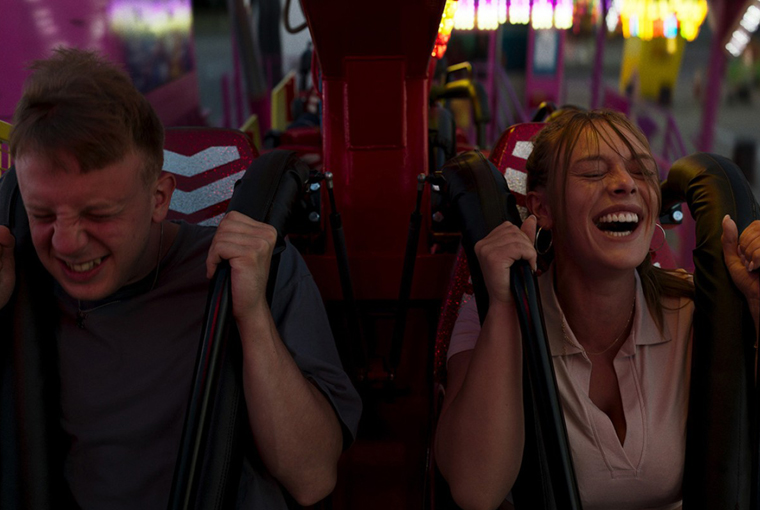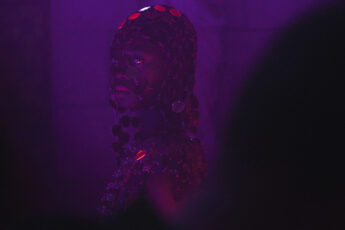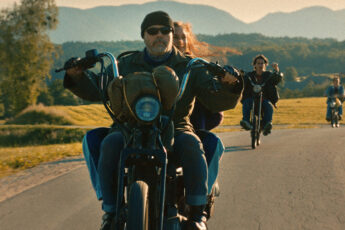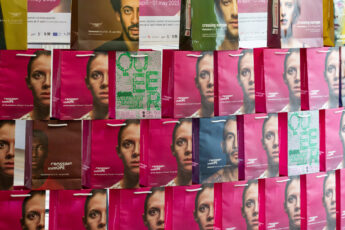Everything That Will Happen Has Already Been Written
Damian Kocur’s Bread and Salt (Chleb i sól, 2022)
Vol. 134 (April 2023) by Jack Page
While at the neighborhood’s local kebab shop, Tymek asks, “Did they welcome you with bread and salt?”. Typically offered at traditional Polish weddings, the food represents both a blessing that the couple will remain in good health (symbolized by the bread) but also warns them of the potential obstacles marriage life may throw at them (represented by the salt). The innocuous Arabic owner of the restaurant replies that the sharing of bread and salt means something different in his native customs: the act symbolizes thankfulness and the allegiance between two parties. Amicably, they agree both versions complement each other, and their meanings run parallel. It is a rare moment of unity between the Arabic and Polish communities and one that is unfortunately short-lived. Based on true events, the story of Bread and Salt culminates in a racially charged crime between a local Polish gang and Arab workers. Kocur’s film tackles the social issue of xenophobia, a problem that the filmmaker believes has seen a resurgence of late in Poland and Europe as a whole.
A graduate of the Warsaw Academy of Music, Tymek (Tymoteusz Bies) is a learned scholar and pianist, returning to his family’s home for the summer holidays. Back in the disenchanting community in which he grew up, Tymek at first resists falling into the same habits of his youth. He teaches his equally gifted younger brother Jacek (Jacek Bies) better technique and form, explaining theory and history with an avid, pompous delight. If an error is made when playing, he remarks, “You do not respect the composer!” Initially, Tymek does not engage naturally with his old school peers. His time away in the cultural capital has led him to outgrow such base pleasures as drinking, smoking, and swearing. He often bares an embarrassed grimace as his cohort wrestles and roughhouses in the street, rapping puerile rhymes with their amateur beatboxing. Tymek shies away from displays of overt masculine aggression and competition. He even shuns the sexual advances of his high school sweetheart, who bitterly questions his sexuality: “Is it true Chopin was a fag?” When his gang of friends cause trouble – damage to property or verbally abusing the kebab shop workers – he wears an apologetic countenance and never intervenes. At one point, Tymek even feigns pure ignorance when another group of youths racially abuse the shop owner on a bus, stealing his backpack. This intentional avoidance of confrontation later switches to engagement and involvement. The more Tymek is exposed to his friends and these troublesome activities, the less pretentious he acts. Even his language becomes more colloquial as he inherits their bad habits. By the end of the film, Tymek is complicit in the racial abuse at the kebab house. His laughter and enjoyment at the gang’s bullying only encourages them further. It is as if Tymek has regressed into his teenage former self, but worse, as he should know better.
In a suspicious switching of perspective, a silent montage of CCTV stills captures every interaction of Tymek at the kebab house throughout the film. During the main narrative, the audience are given Tymek’s point of view of the restaurant as he frequents the shop with his rambunctious acquaintances. From this perspective, the atmosphere seems ebullient, as the guests dine together, joking after a night on the town. A physical altercation may be teased but never materializes as the racial tensions rise on each occasion. Yet there is something damning about the CCTV aesthetic. Only when shot through the eye of the security camera does the spectator share the fears of the kebab owners. Now, the gang’s numbers seem to dominate the cramped interior. They linger menacingly outside, their gestures hostile and unpredictable. In the absence of audible dialogue, their actions are reduced to volatile movements. Tymek’s last encounter at the kebab house sees the inebriated gang break into the restaurant. The Arabic owners have exhausted their patience with the rude customers and after being repeatedly threatened, a tussle ensues. As the rabble dies down, the sequence is cut short by the pixelated CCTV footage. The still image shows a barely visible grey shadow protruding from the Arabic waiter’s fist. The subsequent shot is a close up of Tymek’s brother lying in the street. Under his white shirt a thick trail of deep red blood pools around his midriff. The oblivious Tymek and his girlfriend futilely run to his aid, broken at the sight and realization that Jacek has been stabbed to death.
In this film, the roots of racism are insidiously embedded early on. Tymek’s denial and failure to intervene provokes its repetition and – inexorably – its habituation. How can we stop racism if we can’t even stunt it? Although the tragic incident of Jacek’s death is an arguably dramatic close, the narrative event is developed organically within the story, fueled by previous acts of hatred and fear that appear seemingly inconsequential. The racial tension that builds throughout the film stems from a lack of communication, a reliance on stereotyping and a negligence of understanding. Beware the paranoid neighborhood watch and beware the misconstrued outsiders or you will reap what you sow. Kocur’s cinematic suburb has a genuine cast of non-professional actors who employ a substantial amount of improvisation. Worryingly, these scenes couldn’t feel any closer to home. Their convincing display of fraternity looks like it could be plucked from the very streets outside of our own backdoor. Bread and Salt’s uncomfortable conclusion raises integral questions about race relations and xenophobia. It is a tale about the dangers of adopting small town mentality and plays on realistic social expectations of exclusion, blurring the lines between witness, accomplice, and victim.




Leave a Comment